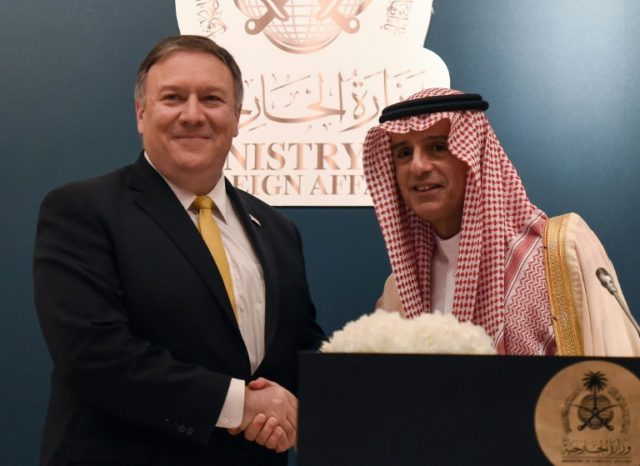Secretary of State Mike Pompeo called for unity among the Gulf states against the “common challenge” of Iran during his trip to Saudi Arabia on Sunday.
Pompeo predicted that Saudi Arabia, the United Arab Emirates, and the other Gulf states would settle their differences with Qatar, which they are currently isolating because the Qataris are accused of supporting terrorism and moving too close to Iran.
“They will find a solution, and I think they will all agree that it is in the interest of all that the Gulf States find a way to be together,” he said. “We have a common challenge, which is Iran, and I think they all recognize it, and we hope they will resolve their dispute in their own way.”
Pompeo was received by King Salman bin Abdulaziz in Saudi Arabia and attended a meeting of top Saudi and U.S. diplomatic officials to discuss bilateral relations and recent events in the Middle East.
At a joint press conference with Pompeo in Riyadh, Saudi Foreign Minister Adel al-Jubeir declared, “We support Trump’s policy toward Iran, especially with regard to the nuclear agreement.”
Pompeo criticized the nuclear agreement and criticized Iran for destabilizing the region with actions such as arming and supporting the Houthi rebels in Yemen.
According to the New York Times, Pompeo was somewhat more blunt with the Saudis in private about the dispute with Qatar. The Times’ sources said the Trump administration is growing impatient with the “petulant spat within the Gulf Cooperation Council.” Pompeo reportedly told Foreign Minister Jubeir, King Salman, and Crown Prince Mohammed to wrap it up in three separate meetings.
His message is expected to resonate more than the mediation efforts of his predecessor, former Secretary of State Rex Tillerson, because Pompeo is seen as “closer to Trump and thus a more formidable figure.”
Also, while President Trump was initially supportive of the Saudis against Qatar, he recently met with the Qatari emir and became more sympathetic to Qatar’s situation.
Pompeo also pressed the Saudis to ease up on their blockade of Yemen and allow more aid to reach civilians, mindful of the growing threat to regional stability and embarrassing distraction from the U.S. agenda posed by the civil war and humanitarian crisis in Yemen. Reading between the lines, the Trump administration would like to count on Saudi Arabia and its allies as stabilizing forces as the Iran nuclear deal enters a turbulent and possibly terminal phase, while Washington turns its attention to North Korea.
Iran, of course, was not pleased with the outcome of Pompeo’s mission to Saudi Arabia.
“What the US secretary of state has said about the Islamic Republic of Iran’s role and presence in some regional countries is a repetition of empty and baseless claims,” Iranian Foreign Ministry spokesman Bahram Qassemi said on Monday.
Qassemi insisted Iran is a stabilizing rather than destabilizing force, involved in the affairs of other nations like Syria, Iraq, and Yemen due to “requests of their legitimate governments and in line with fighting terrorism in the region.”
“What is said erroneously with regard to Yemen is false, only aimed at deflecting the attention of the international public opinion from the crimes being committed daily by Saudi Arabia in its aggression against the country,” he said.
“It is just a raw and worthless claim in order to perpetuate Saudi Arabia’s conflagration and aggression against Yemen, and continue the destructive and destabilizing presence of foreign powers in the region,” Qassemi charged.

COMMENTS
Please let us know if you're having issues with commenting.